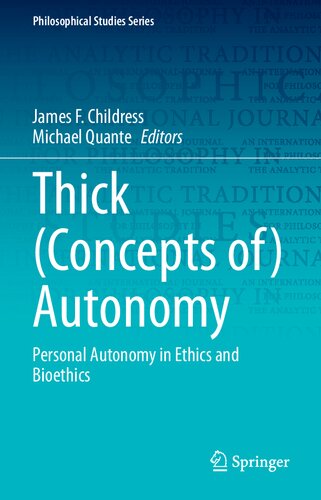

Most ebook files are in PDF format, so you can easily read them using various software such as Foxit Reader or directly on the Google Chrome browser.
Some ebook files are released by publishers in other formats such as .awz, .mobi, .epub, .fb2, etc. You may need to install specific software to read these formats on mobile/PC, such as Calibre.
Please read the tutorial at this link: https://ebookbell.com/faq
We offer FREE conversion to the popular formats you request; however, this may take some time. Therefore, right after payment, please email us, and we will try to provide the service as quickly as possible.
For some exceptional file formats or broken links (if any), please refrain from opening any disputes. Instead, email us first, and we will try to assist within a maximum of 6 hours.
EbookBell Team

4.8
104 reviewsThis book explores, in rich and rigorous ways, the possibilities and limitations of “thick” (concepts of) autonomy in light of contemporary debates in philosophy, ethics, and bioethics.
Many standard ethical theories and practices, particularly in domains such as biomedical ethics, incorporate minimal, formal, procedural concepts of personal autonomy and autonomous decisions and actions. Over the last three decades, concerns about the problems and limitations of these “thin” concepts have led to the formulation of “thick” concepts that highlight the mental, corporeal, biographical and social conditions of what it means to be a human person and that enrich concepts of autonomy, with direct implications for the ethical requirement to respect autonomy. The chapters in this book offer a wide range of perspectives on both the elements of and the relations (both positive and negative) between “thin” and “thick” concepts of autonomy as well as their relative roles and importance in ethics and bioethics.
This book offers valuable and illuminating examinations of autonomy and respect for autonomy, relevant for audiences in philosophy, ethics, and bioethics.